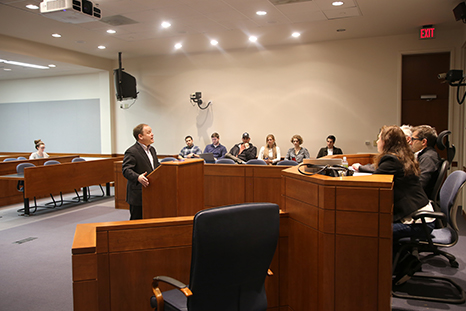Law students and faculty from the University of Virginia will return to the nation’s capital Tuesday to see a case they prepared – City of Hays, Kansas v. Vogt, testing the limits of compelled testimony – argued at the highest court in the land.
The School of Law’s Supreme Court Litigation Clinic is representing the city in the question of whether the Fifth Amendment is violated when statements are used at a probable cause hearing, but not at a criminal trial.
Professor Toby J. Heytens, on leave from UVA Law after being named Virginia’s solicitor general, will argue for the clinic, which introduces third-year law students to all aspects of current U.S. Supreme Court practice.
Law students helped prepare the case under the guidance of Heytens and the clinic’s director, law professor Dan Ortiz. (Heytens was slated for the appearance prior to being named to his new role.)
The city of Hays is being sued by one of its former police officers, Matthew Vogt. He claims that, as part of an internal investigation, he was required to provide information about how he came into possession of a knife while on duty – or risk being fired. The officer felt compelled to explain and was later charged in a criminal offense.
The Fifth Amendment’s self-incrimination clause provides that no one “shall be compelled in any criminal case to be a witness against himself.” But the clinic will argue that this right is a trial right only.
“The justices are going to resolve whether the Fifth Amendment right against self-incrimination is a trial right, or whether that right attaches in probable cause hearings as well,” clinic participant and law student Rebecca Sciarrino said.

“A number of the justices have called the Fifth Amendment right a trial right in different contexts, and this case presents the justices with the opportunity to define the parameters of this fundamental right.”
The justices agreed in September to hear the case.
Heytens, a 2000 graduate of the Law School, first joined the faculty in 2006 and then rejoined it in 2010 after three years working in the Office of the U.S. Solicitor General, during which time he argued six cases before the U.S. Supreme Court. Sciarrino said working on the case under Heytens’ tutelage has broadened her understanding of the constitutional issues.
“As students working on the merits stage with Professor Heytens, we got to know about an exciting area of law from a number of different angles,” Sciarrino said. “It will be fun to learn more about the justices’ takes on the issues through oral argument on Tuesday.”
Media Contact
Article Information
February 16, 2018
/content/uva-law-clinic-returns-us-supreme-court-fifth-amendment-case

